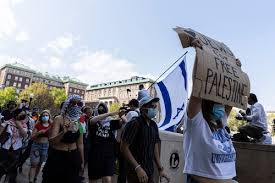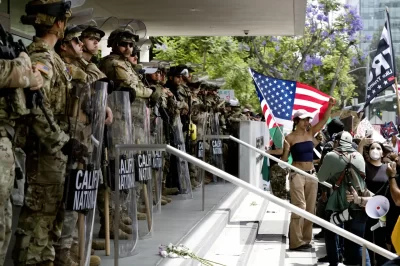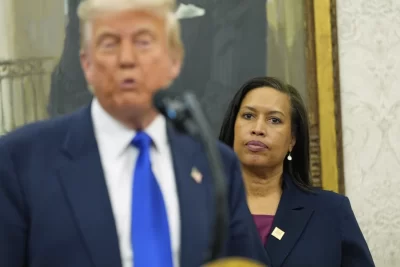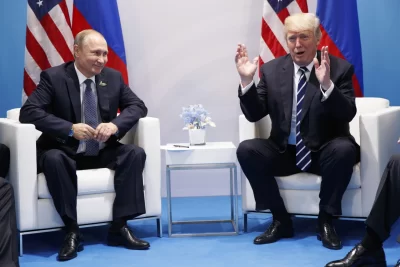
NEW YORK — Dozens of protesters took over a building at Columbia University in New York early Tuesday, barricading the entrances and unfurling a Palestinian flag out of a window in the latest escalation of demonstrations against the Israel-Hamas war that have spread to college campuses nationwide.
Protesters on Columbia’s Manhattan campus locked arms in front of Hamilton Hall early Tuesday and carried furniture and metal barricades to the building, one of several that was occupied during a 1968 civil rights and anti-Vietnam War protest on the campus, video footage showed. Posts on an Instagram page for protest organizers shortly after midnight urged people to protect the encampment and join them at Hamilton Hall. A “Free Palestine” banner hung from a window.
“An autonomous group reclaimed Hind’s Hall, previously known as ‘Hamilton Hall,’ in honor of Hind Rajab, a martyr murdered at the hands of the genocidal Israeli state at the age of six years old,” CU Apartheid Divest posted on the social media platform X early Tuesday.
Hamilton Hall is an academic building that opened in 1907 and is named after Alexander Hamilton, who attended King’s College, Columbia’s original name.
The student radio station, WKCR-FM, broadcast a play-by-play of the hall’s takeover, which occurred nearly 12 hours after Monday’s 2 p.m. deadline for the protesters to leave an encampment of around 120 tents or face suspension.
University representatives did not immediately respond to emails requesting comment early Tuesday, but the public safety department said in a statement that access to the campus has been limited to students living in the residential buildings and essential employees, such as dining, public safety and maintenance staff. There was just one access point into and out of campus.
“The safety of every single member of this community is paramount,” the advisory said.In the X post, protesters said they planned to remain at the hall until the university conceded to CU Apartheid Divest’s three demands: divestment, financial transparency and amnesty.
Universities across the U.S. are grappling with how to clear out encampments as commencement ceremonies approach, with some continuing negotiations and others turning to force and ultimatums that have resulted in clashes with police.
Dozens of people were arrested Monday during protests at universities in Texas, Utah, Virginia and New Jersey, while Columbia said hours before the takeover of Hamilton Hall that it had started suspending students. Columbia had already canceled its main graduation event.
Police moved to clear an encampment at Yale University in Connecticut on Tuesday morning, but there were no immediate reports of arrests.
Yale and New Haven police surrounded the encampment in the Cross Campus quad with caution tape starting around 6 a.m. and said that anyone inside the blocked-off area would be subject to arrest and suspension if they did not leave, The Yale Daily News, an independent student newspaper, reported. Officer Christian Bruckhart, a New Haven police spokesperson, said no arrests had been made as of 7:30 a.m.
Also on Tuesday, police began to clear an encampment at the University of North Carolina at Chapel Hill. WRAL-TV reported that police could be seen removing protesters, some of whom were led away with zip ties around their wrists.
And at the University of Connecticut, police ordered protesters to remove tents Tuesday morning, but the protesters ignored the directives, school spokesperson Stephanie Reitz said. Officers then entered the site to remove tents and tarps and make arrests, she said.
The nationwide campus protests began as a response by some students to Israel’s offensive in Gaza after Hamas launched a deadly attack on southern Israel on Oct. 7.
Militants killed about 1,200 people, most of them civilians, and took roughly 250 hostages. Vowing to stamp out Hamas, Israel has killed more than 34,000 Palestinians in the Gaza Strip, according to the local health ministry.
Israel and its supporters have branded the university protests as antisemitic, while critics of Israel say it uses such allegations to silence opponents. Although some protesters have been caught on camera making antisemitic remarks or violent threats, organizers of the protests, some of whom are Jewish, say it is a peaceful movement aimed at defending Palestinian rights and protesting the war.
At the University of Texas at Austin, an attorney said at least 40 demonstrators were arrested Monday. At the University of Utah, police dragged students off by their hands and feet, snapping the poles holding up tents and zip-tying those who refused to disperse. And at Princeton University, students were arrested after briefly occupying a building that houses its graduate school.
The plight of students who have been arrested has become a central part of protests, with the students and a growing number of faculty demanding amnesty for protesters. At issue is whether the suspensions and legal records will follow students through their adult lives.
The Texas protest and others, including in Canada and Europe, grew out of Columbia’s early demonstrations. On Monday, student activists defied the 2 p.m. deadline to leave the encampment. Instead, hundreds of protesters remained. A handful of counter-demonstrators waved Israeli flags, and one held a sign reading, “Where are the anti-Hamas chants?”
While the university didn’t call police to roust the demonstrators, school spokesperson Ben Chang said suspensions had started but could provide few details. Protest organizers said they were not aware of any suspensions as of Monday evening.
In a rare case, Northwestern University said it reached an agreement with students and faculty who represent the majority of protesters on its campus near Chicago. It allows peaceful demonstrations through the end of spring classes in exchange for some concessions.
At the University of Southern California, organizers of a large encampment sat down with university President Carol Folt for about 90 minutes Monday. Folt declined to discuss details but said talks would continue Tuesday.
USC officials this month refused to allow the valedictorian, who has publicly supported Palestinians, to make a commencement speech, citing nonspecific security concerns. Administrators then scrapped the keynote speech by filmmaker and alumnus Jon M. Chu and declined to award honorary degrees.




